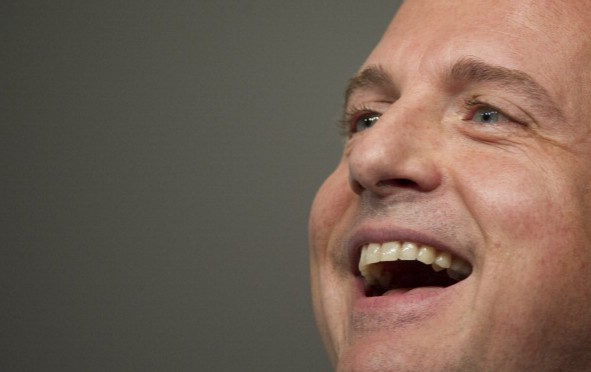Yesterday was a weird day.
It started normally enough. I woke up thinking about my list:
- Prayer
- Grade some papers
- A few appointments to talk with some people about God1
- Got that wedding tonight
Maybe I shouldn’t have checked Twitter.
But I did, and what I found was that ESPN, the Worldwide Leader in Sports, had decided to part ways with their biggest journalistic star: the Sports Guy, Bill Simmons.
I understand that this may not seem like a big deal. But it is.
***
For those not in the know, Bill Simmons, AKA the Sports Guy, is a forty-five year old sports writer. Simmons – as both his college classmates and millions2 of readers are much more likely to call him – has been working for ESPN since 2001. He’s made his name writing a column (and doing a podcast and, increasingly, TV/video) filled with pop-culture references, jokes, and personal asides.
For the 18-40 male demo (into which I non-coincidentally happen to fall), what made him so great was that he wrote about stuff everybody in our fragmented culture still had in common: sports and pop-culture.3
Simmons has made his bones writing, yes, about sports, but not in the traditional way. He writes (and opines and pontificates and yeah) about sports seen not from the objective remove of the press box, but from the proximity of the stands. Simmons writes from his own perspective: as a guy who loves sports sitting on a couch next to his buddies. And by writing this way he lets his readers sit in a metaphorical La-Z-Boy next to him, have a non-metaphorical beer, and laugh along.
What I mean is, Bill Simmons matters – and his being more or less fired by ESPN matters – because fifteen years ago4 he was writing to sports fans as a fellow fan.
And this is a big deal.
***
It’s not that Simmons was the first to break the wall of journalistic objectivity. The New Journalism of Gay Talese and Joan Didion started hammering at that wall decades ago. David Foster Wallace5 took the mallet into his own hands and struck a few blows. And so, with his hazy, blitzkrieg prose, did Simmons’s former ESPN Page 2 mate Hunter S. Thompson. But Simmons saw something more, he saw, as the Times’s Noam Cohen put it in 2009, that his job was “not to get into the heads of the players, but into the heads of his readers.” And he did.
It’s this move of Simmons’s that leads many to credit him with being one of the proto-bloggers, one of those who understood what was going to change in the move from print to digital journalism and to capture it. What this change was is maybe best expressed as a move from a broadcast/print model of communication to a relational/digital model. (Stick with me for a second here.)
In the old broadcast/print model, mass communication only ran one way: out. The broadcast big boys grabbed information, decided which parts of it were relevant, and told all the rest of us what mattered and why. (I bet with even this two sentence, shadowboxing description that you can sense how antiquated this model is; that it’s gone.)
In the new model, the model Simmons grasped as early as anybody, communication runs both ways.6 It’s all about personality, relationality, and celebrity. It’s about owning up to biases, sports- and other-wise, and doing your best to make an argument anyway, from your particular perspective. This is what Twitter and the Player’s Tribune are doing.7
Another way to talk about this is to talk about celebrity. In the old broadcast model the institution was the celebrity, the trusted brand. Today it’s the person we trust, not the name on the masthead. In other words: we don’t watch Comedy Central, we watch Colbert. Or, re: the topic at hand, I don’t really read ESPN, I read Simmons. And I read Simmons because I know him, I trust him. This is what’s changed8 in the way media functions today.
The fact that Simmons grasped this change so quickly means two things: first, as Todd VanDerWerff argued yesterday over at Vox, it means that he was at the front line of all these new boutique/prestige websites – like FiveThirtyEight and Grantland and, yes, this very site you are on right now9 – that are backed by larger media conglomerates.
Second, and at least for this guy much more importantly, Simmons helped popularize the casual rhetorical style we now know as blogging. He was able, by writing like the guy sitting on the couch next to you – to do what so many bloggers do today: include family and friends in their work, write about their own lives and how those lives admittedly shape what they’re seeing in the streets, in the halls of government, and on the field.
The thing is that Simmons has been doing this for 15 years, and even though I’ve never met him, in 15 years I’ve spent a lot of time with him. I’ve spent enough time with him, I mean, to feel like I’m his friend.
***
Look, I know Aristotle is right when he talks about friendship as reciprocal good will. And I know that this means I should have written “friend” instead, put in scare quotes… because, again, I’ve never met the guy. I know that Bill Simmons and I are not really friends.10
But since Simmons has been at ESPN I’ve spent more time than I care to admit on the digital couch next to him. I’ve read and watched and listened to virtually everything published under the “Bill Simmons” byline. I’m an NBA fan today mainly because Simmons taught me how to love the game. I read retroactive diaries and I (guiltily) rooted for the 2004 Red Sox because of Simmons.11
Last year at Thanksgiving I staged a Fast and Furious marathon in my Jesuit community partially because Simmons and Adam Carolla had recorded an 80-minute-long podcast in which they did hilarious Vin Diesel impressions. I’ve run dozens and dozens and dozens of treadmill miles while listening to Simmons talk basketball with Joe House, baseball with Jack O, and football with Cousin Sal.
I’ve spent fifteen years listening to and thinking alongside and laughing with Simmons and his friends. And Simmons was fired yesterday. And I’m not ready to stop being his friend.
***
I did eight things yesterday that were more important than this news about Bill Simmons. It’s true.
My students matter more to me, and so do those I met with for spiritual direction. And the wedding? Uh, yeah, those two friends of mine promising to love each other forever in front of God and Church and me was just a little more important than the news that a guy I’ve never met has been non-renewed by his employer.12
Plus, Bill Simmons is not universally beloved, and there are reasons: He can be can be petulant and a little whiny, sometimes. He overreacts and there’s a good chance he can be a little vindictive. I know these things.
But, look, none of my friends are perfect. Nor am I. And even though everything good about our relational/digital media age seems to come with this undercurrent of corrosive cynicism (and Simmons gets his share of it)… he’s let me into his life.
I’ve spent 15 years with the guy. I don’t want him get fired. I actually care what happens to him. I don’t want to lose this (super) weird, one-way, digital “friendship” because the bosses at ESPN got their knickers in a twist.13
I’m sure it won’t. I know there are fifty companies vying to be his next digital home and that now Simmons can can go start his own thing and yeah yeah yeah it’s not the point.
The point is that I don’t know if I’m going to get to keep being Simmons’s friend.
And I don’t like it.
— // —
- It’s kind of my job ↩
- Yes, millions. Look at that number. ↩
- Yes, I know. Not really everybody. But right after joining the Jesuits in 2002 I joked that I’d gotten so focused that I could only talk about three things anymore: God, music, and sports. The last is not a coincidence. ↩
- = 15 decades ago in Internet time. ↩
- Lover of the footnote ↩
- I.e., Simmons’s mailbag columns. ↩
- Written by players for fans, the Players Tribune is the kind of thing that only seems imaginable in a digital world… after all, runs the contemporary question, who needs journalists to speak for players when they can speak for themselves? ↩
- For better AND for worse. We’re not ideologues. ↩
- What’s up, everybody at America Media? ↩
- I’m not even sure I would want to be friends with him in “real life”. ↩
- Guiltily both because I’m a Brewers fan and because it’s ironic to be a bandwagon fan because of the guy who wrote the rules for being a fan?! ↩
- Although he did attend a Jesuit college. Relatedly (or maybe not), I don’t think Simmons has ever written or said the word “Jesuit” on any of his many platforms… I’ve been waiting for it just in case. ↩
- And because I’m sure Simmons in not the easiest guy to supervise… ↩



